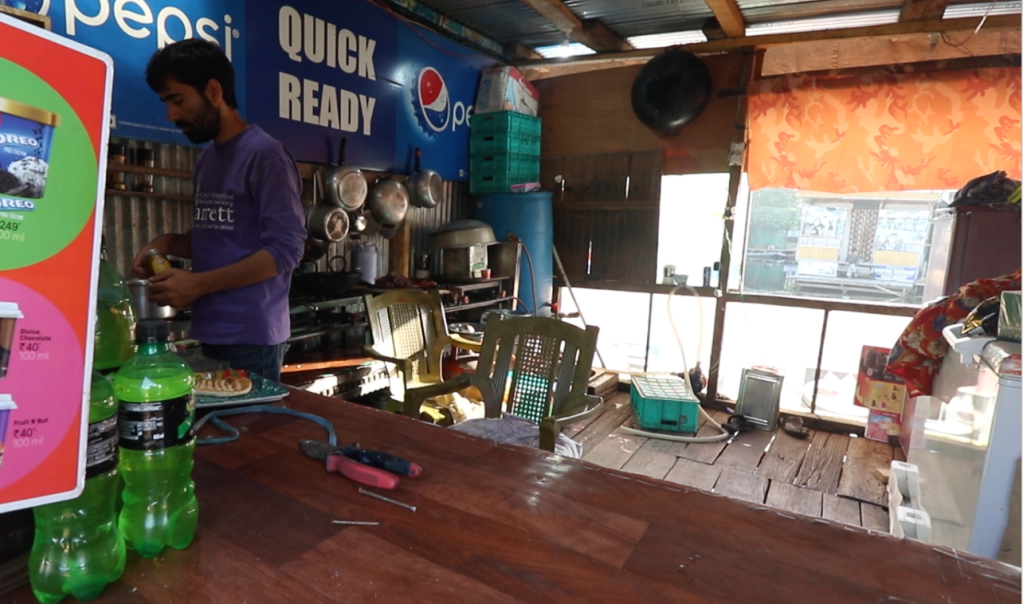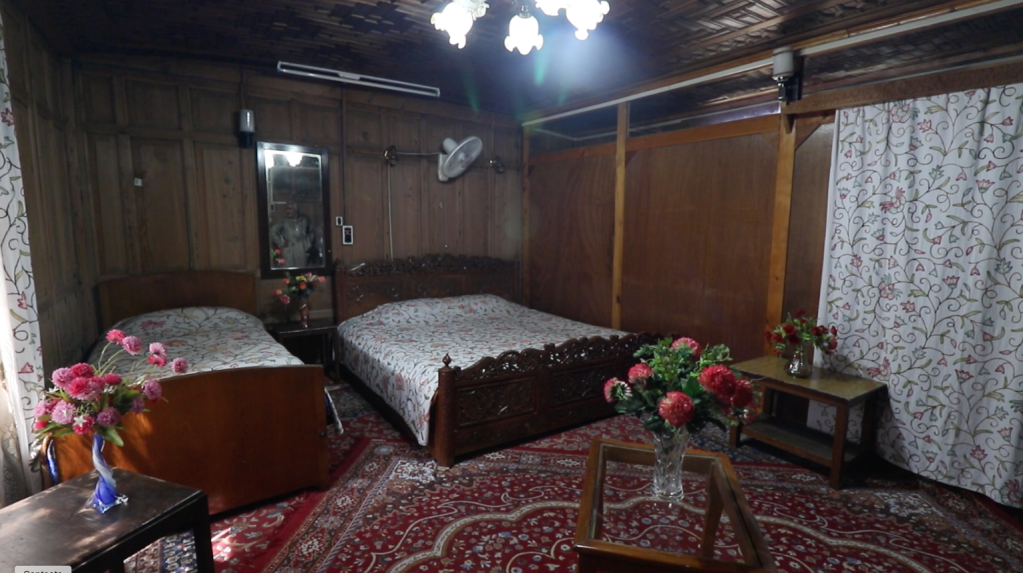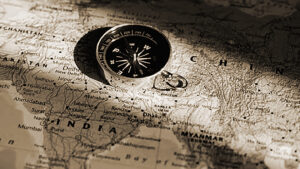This is the fourth part of an EmpireDiaries.com special series on the Kashmir valley on the occasion of the first anniversary of the scrapping of Article 370 in August 2019. You can read the first, second, third and fifth parts here.

 Ratna
Ratna
Srinagar: Hashim, who runs the hotel I was put up in, tried hard to arrange a private taxi or any vehicle that could drive us to places outside Srinagar, but his efforts went in vain.
He rang up his brother who lives in Pahalgam, some of his close friends and drivers from the cabbie network. But all of them refused to drive us to the interiors of the Kashmir valley. I myself also tried to catch hold of a cabbie who would agree to drive us beyond Srinagar, but all of them refused to “risk” it.
Some argued we would eventually be stopped at the city’s border check points and sent back, while others said it would be too risky for us. “What if something happens to you and your friends on the way?” they all argued.
Hashim said if somehow we could land up in Pahalgam, things would be sorted because he owns a hotel there as well, where we could informally put up.
“If you can reach Pahalgam, you won’t have any issues,” he said. “Our hotel is there. Plus, my brother has an apple orchard there. He runs his own fruits business. You are welcome to visit that orchard and pack for yourselves crates of apples as a gift from us.”
The apples from his brother’s garden, and countless from numerous orchards, have sadly been rotting away ever since the lockdown left the transport pipeline frozen.
“This is peak business time for fruit growers. Yet, we are unable to earn a single penny. Don’t know how we will manage this winter,” Hashim lamented, looking back at the days when their family orchard was a sound source of livelihood.
In Srinagar, people who used to earn a living from tourism, horticulture and local businesses, took to selling veggies during the lockdown – that was the only viable business opportunity at that time. That’s largely because veggies are grown and consumed locally, unlike other essential food stuff that were getting caught in the transport freeze.

I found that Srinagar’s ‘lockdown vegetables markets’ opened only during two windows in a day – between six and nine in the mornings, and again from six-to-nine in the evenings. These are the only two occasions when I could spot locals outdoors, venturing out for essential shopping.
I caught up with an elderly woman who was buying vegetables at a makeshift stall near the Cantonment area. “What to say? Can you live a life like this? Are we like rabbits that you will let us come out of the cage for a limited period of time? Can you manage like this day after day, month after month? We are like prisoners. Don’t know how long this will go on,” she said.
She would have obviously gauged that I was an outsider and hence made her displeasure felt before quickly wrapping up the chat and going away. The pain with which she uttered each of those words made me realise the kind of uncertainty most of the locals were in.
Kashmiris are generally known to be full of warmth. They are always welcoming and cordial among themselves and especially towards visitors from other parts of the country.
The Kashmir valley’s economy has predominantly relied on agriculture and related activities, like the export of fresh fruits, dry fruits and saffron. Fruits such as apples, berries, cherries, oranges, peaches, pears are produced sufficiently to meet the needs of the locals as well as to export, fetching earnings in foreign currency.
The horticulture industry is historically a big tradition in the valley. Kashmir is famous for its gardens and flowers. It is home to Asia’s largest tulip garden.
Kashmiris have also traditionally made good earnings from its woolens industry. Its woolies, shawls, ‘pashmina’ and carpets are exported around the world.
For ages, the valley’s economy has been distinctly indigenous and self-reliant.

According to an India Brand Equity Foundation (IBEF) report, J&K’s Gross State Domestic Product (GSDP) increased in 2018-19. The report says the region’s Gross State Domestic Product (GSDP) grew 9.63% between 2015-16 and 2018-19, reaching Rs 1.57 trillion ($ 24.42 billion).
So, it is no wonder that Kashmiris are deeply distressed at having lost the economic freedom and self-reliance that they had been enjoying. The question is, if Kashmir was already self-reliant, then why are we even debating the need for development in the region?
“Inviting foreign companies to do business here to make profits, giving away land for FDI, making ordinary Kashmiris work for big corporate brands as mere employees – is that what you call self-reliance?” exclaimed Bilal, a boatman, as he sat on the edge of his bright yellow shikara. The sun was going down over the Dal Lake. The mid-day silence of the city under curfew was slowly giving way to the occasional whizzing and honking of cars as they purred down Boulevard Road. Vendors were beginning to set up makeshift shops to sell veggies during the evening’s three-hour relief from curfew, while desperate shikara-walas flocked us, hoping to coax us for a ride with not a single other customer in sight.

In good times, a shikara ride on the Dal Lake came for Rs 600 per hour. But with tourism deemed almost non-existent, the oarsmen, struggling to make their kitchens run, were offering rides for as low as Rs 100.
The banks of the otherwise enchanting Dal Lake wore a ghostly look as yellow-coloured shikaras were moored, all lined up with no sign of any business. Even the houseboats anchored far out towards the farther banks of the Dal Lake were all empty as far as my eyes went. Seen as precious jewels of Kashmir’s tourism industry during normal times, the unusually empty houseboats now literally resembled corpses as they disappeared into the uneasy darkness of the night when the last light of dusk faded out.
As darkness shrouds the lake and its long array of houseboats, a certain emptiness appears to devilishly surround the wooden ghost houses and tie them up in knots. That emptiness breathes down the backs of the lakeside vendors trying to sell their little stock of veggies to locals, as if to condemn them into a slow but sure doomsday.
There was a time when Bilal would hardly get time off ferrying tourists on the lake, often till after midnight during the valley’s romantic summers. Now, time has stood still for him as he sat on the cemented steps of the Dal Gate area bordering the waters. His mind was clogged with concerns of how he would find the money to buy milk for his kids for the next morning.
Every day during that trip, I bumped into Bilal every single day I walked out of my hotel. From early morning until late in the evening, he would be sitting by the lake on Boulevard Road.

“Believe it or not, you are my first customer since 4th August (2019),” he said in a mocking tone. “Tell me, how will I run our kitchen? I have three kids. I have two brothers and a sister. They have kids, too. We all live together. Tell me how we will feed our kids. This is the peak tourism season for us. This is the only time we make some good savings to last out the winter. In these uncertain times, people won’t visit the valley. And this will make us starve in the winter.”
As Bilal took me for a long shikara ride one late afternoon deep into the less touristy backwaters of the Dal Lake, I found that the shops that serviced the local economy were shuttered, barring the odd tea shack or basic grocery outlet.
In nooks and corners of the lake’s inlets, I spotted quite a few camps set up by the forces.
On my request for a cup of kahwa, the local tea, Bilal took me on his shikara to one of the small tea shops set up in the middle of the lake.

The shop was open, but with no customers around. It was absolutely quiet. The only sounds came from the chirping birds and oars of Bilal’s shikara gently slicing through the water. Is this the Kashmir that the country dreamt of and wanted?
“If there are no tourists, who will buy tea from us? Local people want to save whatever money they have for the coming days as things are uncertain,” the owner of the shop said.
We paid Rs 60 for each cup of kahwa. It’s expensive tea going by the financial condition of the locals amid the lockdown. People from the surrounding neighbourhoods were rather more concerned about their future and survival. Gone were the days of relishing lakeside life.

During the boat ride, Bilal fished out water chestnut from under the lake’s tranquil surface and asked me taste it. “Khao madam khao. This lake is our lifeline. We get so many things from here, our life and livelihood surround this lake,” he said.
I tried the chestnuts. They were sweet and juicy.

Bilal’s larger family owned a houseboat. The suite came for Rs 4000 per day while a single bedroom was priced at Rs 1,000 to Rs 2,000 per night, depending on the rush. Naturally, it had been lying idle since August 5, 2019.
Bilal took me to his houseboat, showed me the wonderfully carpeted and traditionally decorated rooms – complete with classy Kashmiri-style fir fittings – and treated me to homemade kahwa. “Next time you come to Kashmir, you must stay here. You don’t have to pay. This suite will be yours,” he said.

As Bilal showed me around the inside of the family houseboat, I was lost in the stunning and rich beauty of the décor. There were lovely papiere mache handicraft items and spellbinding miniature art on flower vases, crockery, lamps, side tables, sofas and all kinds of furniture.
After a little chat with Bilal’s family members, I was treated to a late afternoon round of kahwa on the deck of their houseboat, looking out across the lake towards life on the Boulevard Road limping away.
After getting to know that I hailed from Bengal, Bilal said, “Bengali tourists always make it a point to come here every year around this time of the year. During the Durga Puja break, tourism peaks here because a huge number of Bengalis visit Kashmir. They freely spend a lot of money, buying a lot of our things.”

Shaking off the daze from the good old days, the shikara-wala said in a tone of disappointment, “Can you really tell me what kind of development is coming to Kashmir? Big companies will come here and buy up our land, isn’t it? But what will the companies do here? We don’t need companies. We are doing well all by ourselves. We are self-sufficient. We don’t want them to turn us into slaves.”
Going by the Kashmiris’ history of self-reliance, Bilal was not wrong.
(To be continued)








